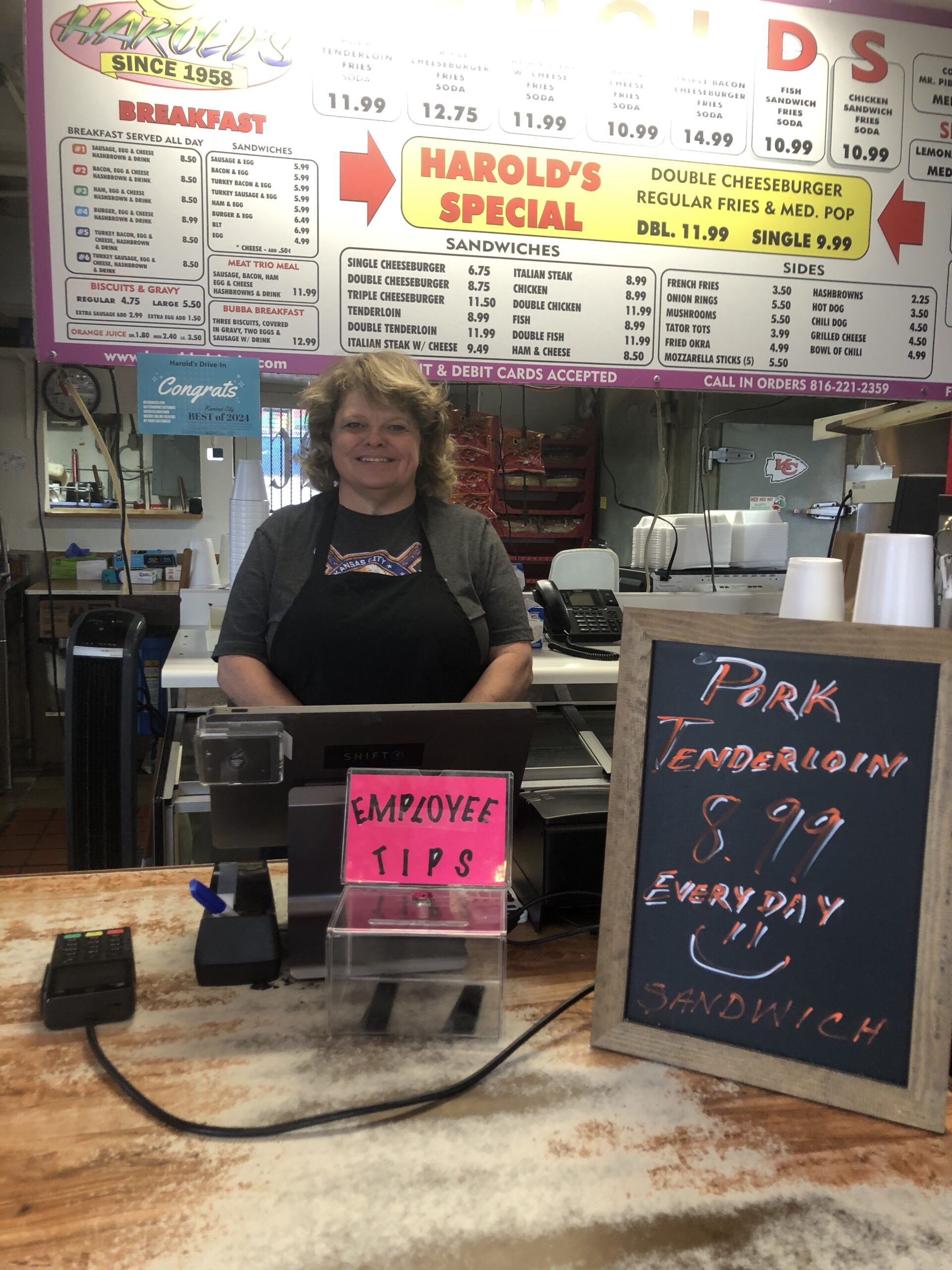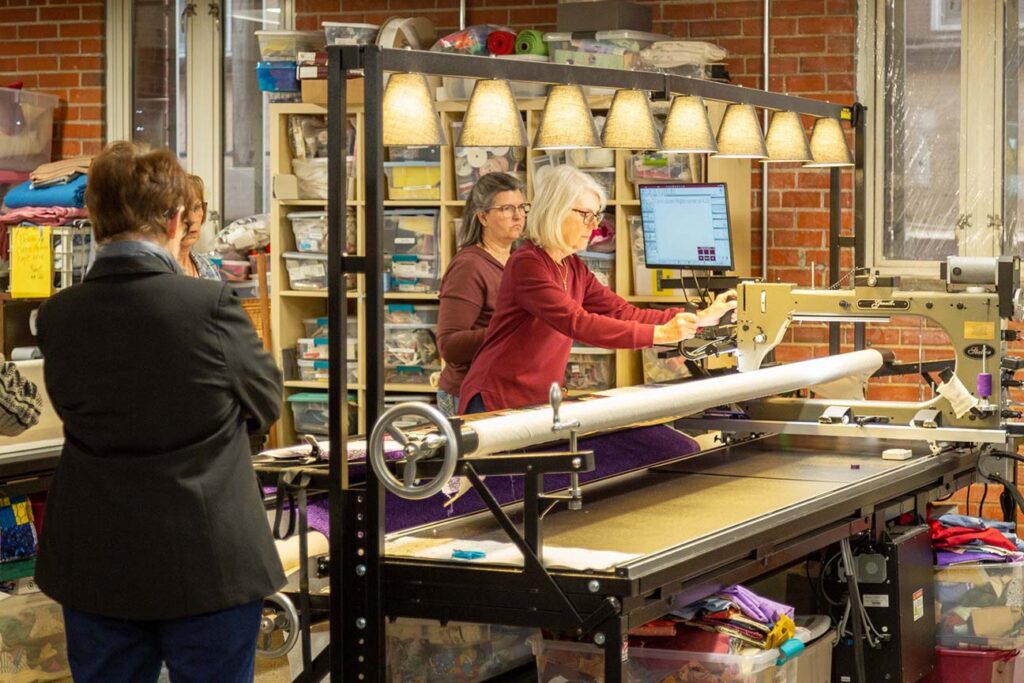
Abby Hoover
Managing Editor
The Plaza Rotary Club recently launched a Microloan Program for entrepreneurs at The Sewing Labs, making students’ small business dreams one step closer.
The pilot program is a collaboration between the Plaza Rotary Club, AltCap, and CHES, Inc., with the goal of advancing economic equity in Kansas City.
Nancy Shawver, Plaza Rotary Club member and organizer of the RISE Microloan program, explained that the club is a non-partisan, non-religious, international service organization with the mission of service to others.
“The idea is to identify a need and figure out how you can help,” Shawver said. “In the Plaza Rotary Club, in the last couple of years, we’ve formed a Justice Committee that really tries to focus on issues of equity right here in Kansas City.”
They recognized that there’s an opportunity gap for people looking for funding to start a business. Partnering with The Sewing Labs, they saw that many of their students may not qualify for a traditional business loan after they complete the program.
“We decided to see if there was a way we could step in and help fill the gap, help people obtain financial stability, help people one at a time,” Shawver said.
The club reached out to AltCap, which is focused on supporting small business and community development, which was happy to work with them. They began partnering to provide microloans and financial education to The Sewing Labs as a pilot program. Their goal is to expand it to other nonprofits in the future, especially those that provide workforce development or pathways to financial stability.
Members of the Rotary Club have volunteered or taken classes at The Sewing Labs before, and Shawver said it’s safe to say, “We’ve fallen in love with them.”
“It’s such a beautiful organization, they do such good work,” she added. “It was easy for us to look at them as a perfect partner.”
The Sewing Labs Manager of Development and Outreach Eileen Bobowski is thrilled with the support her organization has received in recent months, including a federal grant sponsoring students in their 18-month workforce training program. Now, some of those same students may get to implement their skills as small business owners with the help of microloans.
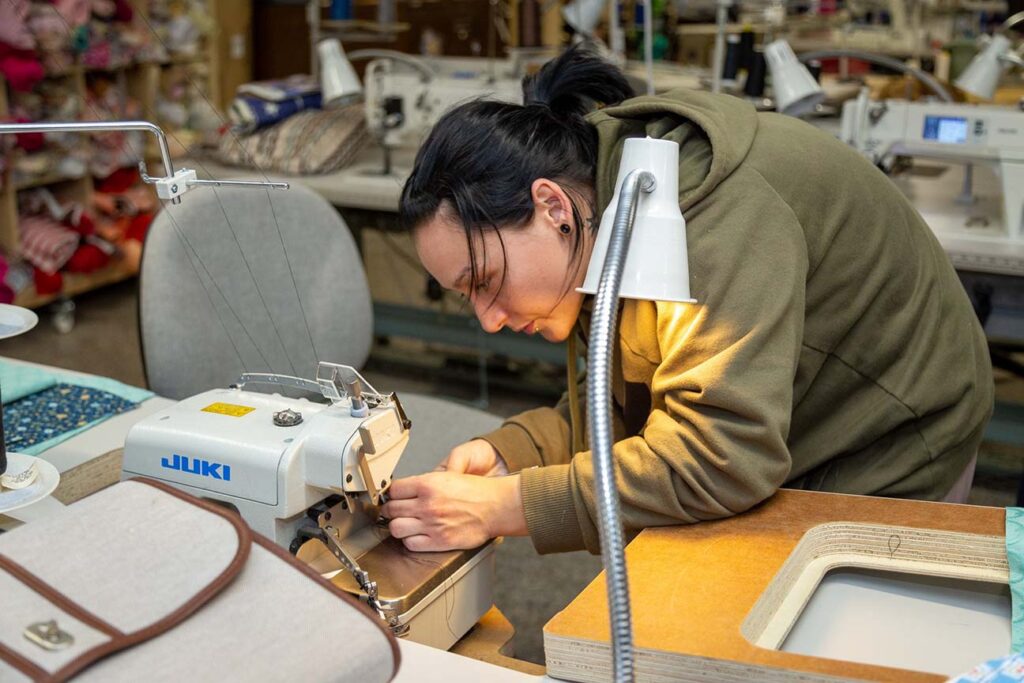
“Our first 12 are coming through right now, we will have another cohort in June of 12, and we’ll have another cohort in October of 12, So 36 students per year for the next three years,” Bobowski said. “In the meantime, our friends at the Plaza Rotary, who are huge champions of ours, and have been – like they helped move us in here from our old space and they’re just really great – they have had this idea kind of mulling around for a long time and it finally got kicked off the ground. And that is this pilot.”
The RISE Microloan program is for the entrepreneurs at heart, Bobowski said.
“So it could be somebody who is in the apprenticeship program, but it’s to give them the capital that they need, a microloan, as they launch their entrepreneurial business,” Bobowski said. “So say there’s a student in our program who comes from an adverse situation, who may have come from another agency here in town, and they are going through their training and they really have got to focus on honing their skills. They can come here, but what if they had their own industrial machine at home that they could then use to grow their own entrepreneurial side gig while they’re in their apprenticeship?”
Many local businesses are looking to hire trained stitchers, and The Sewing Labs has produced professional stitchers who go into a variety of industries for their apprenticeship and on to full-time employment with one of their partner businesses.
However, not all students follow that path. One graduate had an idea to go to craft shows and approach artists about helping them sew their inventory.
“She’s gone into business for herself, and so she saved all her money up during the apprenticeship to be able to afford an industrial machine that could tackle all the different types of sewing that she might need to do,” Bobowski said. “And so that’s where this comes in. Because if there’s a student out there who needs that capital, maybe they need $3,000, maybe they need $2,500, to be able to pay back through a microloan situation, it is just incredible for the students in our program.”
If the program is successful, the partners plan to take the model to other nonprofits. It will provide opportunities for entrepreneurs who may not qualify for traditional business loans.
“I think micro loans is a concept most people are not very familiar with, and so having these experts in the room to be able to guide them and know that we’re here as resources for them is what’s exciting,” Bobowski said.
The organizations plan to host training sessions with Sewing Labs students to discuss the parameters, how the loans will work, and other financial education.
Bobowski said domestic sewing machines cost anywhere from $300 to $500, but an industrial machine is much pricier.
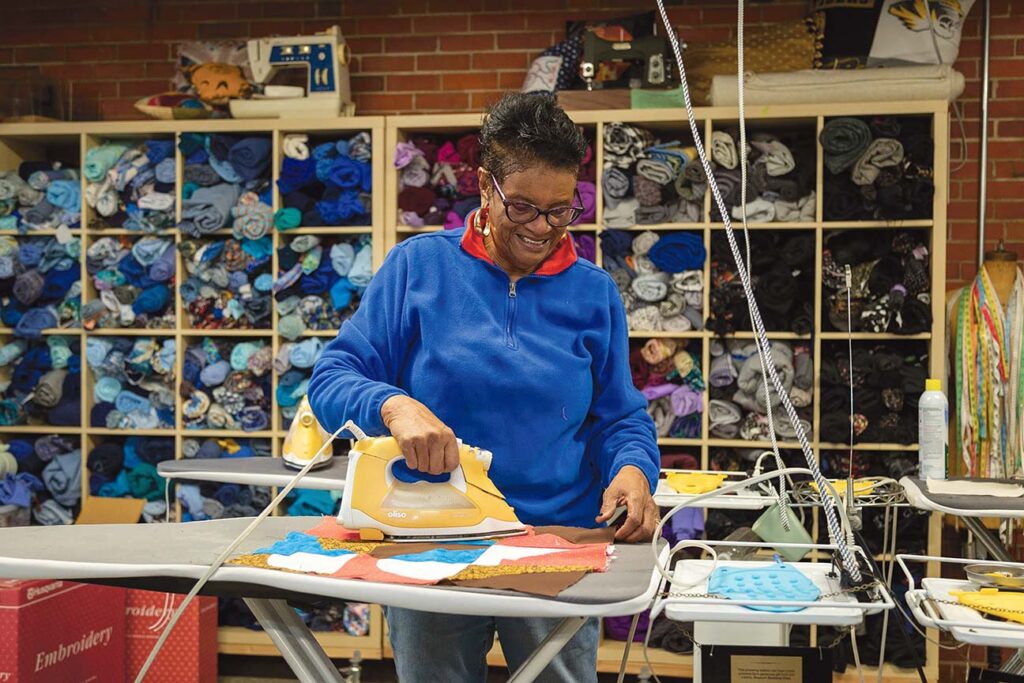
“A lot of them don’t have money. They’re riding the bus, which is free, struggling with housing,” Bobowski said. “The concept of purchasing their own, I’m sure, is foreign to them. It’s giving that hand up, not a handout. This is an amazing entrepreneurial community that we live in here in Kansas City. Just to be able to take that to the next level and be able to also create that pipeline of stitchers.”
Many stitchers do contract work for area employers, for example at Weave Got You Covered, they had contract people that came in and made pillows for them.
During Entrepreneurial Sessions, they’ll go through the FDIC Smart Money for Small Business Program, which teaches about bank accounts, business checking, maintaining records, registering for an LLC, andmore.
“There’s amazing partners here in Kansas City that will help guide them for those things, and we’ll bring them in to talk about that for the students,” Bobowski said. “We’ll bring in the law firms here in town to help guide them. The whole curriculum is provided with booklets and we do it online, so it’s in addition to the training that we’re doing in the room, they have to take these twice a month online classes with the rest of the group and kind of walk through this whole plan.”
They added a marketing portion to the program, and will have monthly mentor meetings with members of the Plaza Rotary Club.
“It is absolutely, critically important,” Shawver said of the workforce development. “We believe financial stability is the core to changing all of the issues in Kansas City. We want to work in housing, education, poverty reduction, but everything really starts with having an income. The sense of stability, the opportunity to grow a business, to network, those are critical.”
If someone needs some guidance on taking on social media, or fixing a problem with QuickBooks, folks around them through the club can help.
“And they (CHES, Inc.) have terrific expertise in building that financial stability, whether its financial education, credit building or credit restoration, or building a savings plan, helping with financial modeling, all those sorts of things, we’ll be looking to CHES, Inc. to help us with that,” Shawver said.
The program guides them through entrepreneur classes and a formal mentorship program over a meal, because food is motivating, Bobowski said. She and her staff always have snacks available for students because “you can’t sew if you’re hungry,” Bobowski always says.
“One of the things I think we realized in working with at-risk individuals is they don’t have a network,” Bobowski said. “They sit down over a meal and then we’ll bring in different experts like this woman who’s got an upholstery business that wants to come and talk about how valuable this skill is and how she’s going to need employees to help. It’s a dying legacy if we don’t do something.”
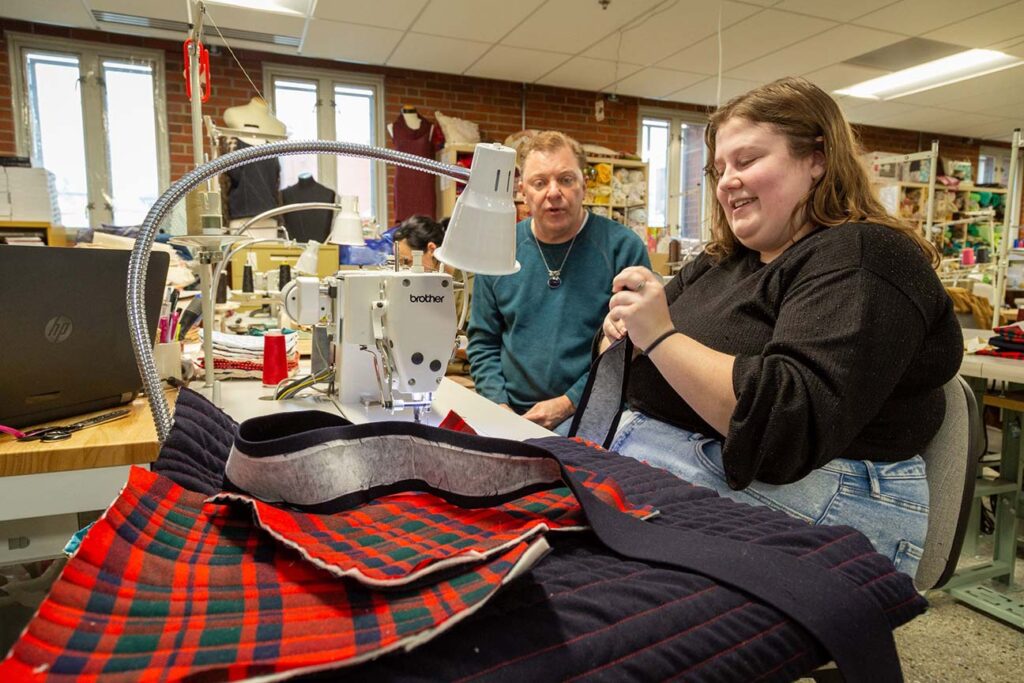
Bobowski said the life skill of sewing has been taken away from the education system, and students have nowhere else to learn it. However, she constantly gets asked how others can start The Sewing Labs in other states.
They are constantly contacted by employers in Kansas City, many of them entrepreneurs themselves, for stitchers.
“They’ve come to us and said, ‘You keep them coming. We need them,’” Bobowski said. “It’s kind of wild that we’re helping to feed that entrepreneurial spirit in a lot of different ways.”
Bobowski encourages local businesses who need stitchers to sign on to be apprenticeship hosts for the program, which is a great pathway for students.
“Especially with stitching, you have to have a human being be able to deal with that flimsiness and flexibility in what you’re sewing,” Bobowski said. “You can’t automate it.”
While some machines, like the long arm stitching machine and the commercial embroidery machine, have CAD-driven systems, there still has to be a human being running them.
“It’s one of those skills that we talk about all the time as being almost automation proof,” Bobowski said. “It’s not like automobiles where they can put all those robots on those parts and put together a car, which makes me a little nervous to be honest with you, but I think people also don’t realize how much in our lives is a sewn product.”
Bobowski thinks the general public takes for granted how many sewn products we use, especially since the manufacturing of those items was shipped overseas for decades.
“It’s starting to come back, and this is a hub,” Bobowski said. “When you think about the whole garment district… there’s a reason that it’s a hub again, and it’s coming back.
AltCap initially helped Weave Got You Covered, the organization’s founders, start The Sewing Labs, so for Bobowski, it’s a full-circle moment.
“This concept that the three women had to create this opportunity to employ people in stitching for the sewn products industry, that was the original goal,” Bobowski said. “We should be putting people to work as stitchers, and now here it’s coming to fruition and they’re still rockin’ and rollin’ over there.”
The Plaza Rotary Club will support The Sewing Labs entrepreneurs through starting their businesses with their built-in network from a variety of industries, and loans of $3,000 to $5,000 for materials and supplies, machines and other start-up costs.



